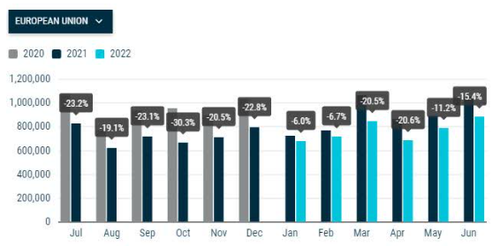
Data from the European Automobile Manufacturers’ Association this week revealed that European Union passenger car registrations plunged 15.4% to 886,510 units, marking the worst June since 1996.
This follows an ugly May, where registrations were also down 11.2%. New car registrations continue to be negatively affected by global supply chain constraints: in the first half of 2022, total registrations fell by 14% to 4.6 million total units, Seeking Alpha noted.
Germany led the charge in June, with registrations plunging -18.1%. Italy and France saw registrations fall -15% and -14.2%, respectively.
Just 187 new electric vehicles were registered in June, versus 390 in June 2021. This bucks a clear growth trend in electric vehicles in places like the United States and China. However, EV's did increase their market share, which now sits at 42.5%.
We noted at the beginning of July that supply chain issues were continuing to wreak havoc in European Auto Stocks. At the time, the Society of Motor Manufacturers and Traders was still attributing the sales drop in June to the "ongoing global shortage of semiconductors" mixed with China's implementation of severe Covid restrictions.
“The semiconductor shortage is stifling the new car market even more than last year’s lockdown. Electric vehicle demand continues to be the one bright spot, as more electric cars than ever take to the road, but while this growth is welcome it is not yet enough to offset weak overall volumes, which has huge implications for fleet renewal and our ability to meet overall carbon reduction targets," said Mike Hawes, chief executive of the SMMT.
He continued: “With motorists facing rising fuel costs, however, the switch to an electric car makes ever more sense and the industry is working hard to improve supply and prioritize deliveries of these new technologies given the savings they can afford drivers.”
And the chaos shows no immediate signs of letting up. As Bloomberg notes, Volvo has already warned that China shutdowns will have a negative impact on its third quarter sales.
Data from the European Automobile Manufacturers’ Association this week revealed that European Union passenger car registrations plunged 15.4% to 886,510 units, marking the worst June since 1996.
This follows an ugly May, where registrations were also down 11.2%. New car registrations continue to be negatively affected by global supply chain constraints: in the first half of 2022, total registrations fell by 14% to 4.6 million total units, Seeking Alpha noted.
Germany led the charge in June, with registrations plunging -18.1%. Italy and France saw registrations fall -15% and -14.2%, respectively.
Just 187 new electric vehicles were registered in June, versus 390 in June 2021. This bucks a clear growth trend in electric vehicles in places like the United States and China. However, EV’s did increase their market share, which now sits at 42.5%.
We noted at the beginning of July that supply chain issues were continuing to wreak havoc in European Auto Stocks. At the time, the Society of Motor Manufacturers and Traders was still attributing the sales drop in June to the “ongoing global shortage of semiconductors” mixed with China’s implementation of severe Covid restrictions.
“The semiconductor shortage is stifling the new car market even more than last year’s lockdown. Electric vehicle demand continues to be the one bright spot, as more electric cars than ever take to the road, but while this growth is welcome it is not yet enough to offset weak overall volumes, which has huge implications for fleet renewal and our ability to meet overall carbon reduction targets,” said Mike Hawes, chief executive of the SMMT.
He continued: “With motorists facing rising fuel costs, however, the switch to an electric car makes ever more sense and the industry is working hard to improve supply and prioritize deliveries of these new technologies given the savings they can afford drivers.”
And the chaos shows no immediate signs of letting up. As Bloomberg notes, Volvo has already warned that China shutdowns will have a negative impact on its third quarter sales.







